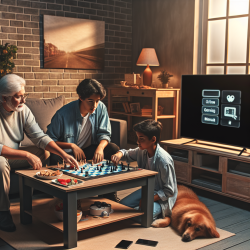Unlock the Secret to Reducing Problematic Screen Use in Adolescents!
In today's digital age, the challenge of managing adolescents' screen time has become a pressing concern for parents and educators alike. With the rapid expansion of the Internet, the focus has shifted from television to online activities, raising questions about how parental mediation can influence adolescents' problematic online screen use. A systematic literature review titled "Linking parental mediation practices to adolescents’ problematic online screen use: A systematic literature review" provides valuable insights into this issue.
Key Findings from the Systematic Review
The review analyzed data from 18 studies on problematic Internet use (PIU) and 9 studies on problematic online gaming (POG), involving over 93,000 adolescents. The research aimed to assess the impact of different parental mediation practices on adolescents' screen use.
- No Mediation: Studies indicated that the absence of parental mediation often correlates with higher rates of PIU and POG, suggesting that a lack of involvement may exacerbate screen use problems.
- Active Mediation: Engaging in conversations with adolescents about their screen use without criticism showed potential in reducing PIU, though its effectiveness on POG was less clear.
- Restrictive Mediation: The impact of setting rules and limits varied, with some studies showing a reduction in PIU, while others indicated no effect or even an increase in problematic use.
- Family Cohesion: A strong family bond was consistently linked to lower rates of both PIU and POG, highlighting the importance of a supportive family environment.
Implications for Practitioners
For practitioners working with children and families, these findings underscore the importance of encouraging active mediation and fostering family cohesion. While restrictive measures may be part of the solution, they should be implemented thoughtfully, considering the unique dynamics of each family.
Practitioners should also advocate for further research, particularly studies that involve direct observations of parent-teen interactions, to better understand the nuances of effective parental mediation in the digital age.
Moving Forward
As technology continues to evolve, so too must our approaches to managing screen use. The review suggests that traditional mediation practices from the television era may not be sufficient for today's digital challenges. Practitioners should remain open to new strategies, such as participatory learning, where parents and children engage with digital media together.
To read the original research paper and delve deeper into the findings, please follow this link: Linking parental mediation practices to adolescents’ problematic online screen use: A systematic literature review.










